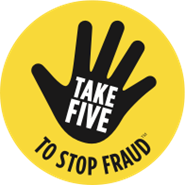
Impersonation Scams
How to protect yourself from scammers impersonating people or organisations you trust to trick you into sharing personal information or money.
What is impersonation fraud?
You’re convinced to make a payment or give personal and financial details to someone claiming to be from a trusted organisation, such as your bank, the police, a delivery or utility company, communication service provider, a government department such as HMRC, or someone you trust like a friend or family member.

Phone calls, texts, messages
These scams often begin with a phone call, text, message or email that appears to be from a trusted organisation or person. They might say your bank account is at risk and ask you to move your money to a ‘safe account’. Criminals can get in touch impersonating a police officer, saying your money needs to be analysed as part of a police investigation.

Social media
They may also get in touch via social media, by sending you messages or creating posts. When criminals impersonate a friend or family member, they often invent reasons to ask for money, such as being stranded overseas or urgently needing to pay bill, rent or debt.

Urgent requests
If you're asked to send money urgently, always be suspicious, especially if you’ve been contacted unexpectedly. Criminals often pressure you to act fast by inventing elaborate stories. Take a moment before parting with your money – a legitimate organisation or individual would never apply time constraints.

Social engineering to gain your trust
Criminals use a tactic called social engineering to groom and manipulate you into transferring money or divulging your personal and financial details. Criminals use many tactics to trick you, including ‘spoofing’, which makes their call, text, direct messaging or email appear genuine. These messages will often lead to a website that is made to look legitimate using another tactic called ‘cloning’. Cloned websites often look almost identical to the real website of a trusted organisation. Phone numbers and sender ID’s can also be cloned to make a scam message appear genuine.

In-person
In some cases, criminals try to dupe you by sending couriers to collect your cards, cash, PINs, or valuable items in person.
How to spot impersonation fraud
- You get a call, text, email, or direct message with an urgent request for personal or financial information, to make a payment, or to move money.
- Perhaps an urgent message from a friend or family member requesting money, such as being stranded overseas or for medical help.
- You’re pressured to act immediately, causing panic. Messages may include a ‘hook’ to grab your attention. The criminal might say your money’s at risk and you should act now to save it, or say you’ll get a reward if you do what they ask.
- You’re asked to transfer money to another account for ‘safe-keeping’.
- You’re asked to buy high value goods or vouchers. They might also demand you pay a tax or utilities bill or provide financial details for rebate.
- You’re told money in your account needs to be analysed for an ongoing investigation.
- The sender’s email address is only slightly different to that of the genuine sender.
How to stay safe from impersonation fraud
- When faced with a request for personal or financial information, stop and think before clicking on any links or replying to text messages asking you to make a payment.
- Never let someone gain remote access to your computer or phone that has called you out of the blue. If it doesn’t feel right, you can hang up on them. Only criminals will persist in getting your information.
- Avoid logging on to financial accounts using public WiFi.
- Banks and/or the police will never ask you to move your money to a ‘safe account’ because your ‘money is at risk’. If this happens, hang up, and call them back on a number you know to be correct. Scammers can change the caller ID to make the number seem trustworthy.
- Only give your personal or financial information out to services you have consented to and are expecting to be contacted by.
Examples of impersonation fraud
Transfer money to a ‘safe account’
You receive a call from someone claiming to be from your bank’s fraud team enquiring if several payments on your account were made by you.
You explain that you don't recognise them. You’re now advised that your account is compromised and to urgently move money to a ‘safe account’, for protection. You’re told not to worry, so you do as you’re told and end up transferring the money from your savings too. The account belongs to the criminal.
Problems with your internet connection
You’re contacted by your ‘internet service provider’ – they inform you that your internet router has been hacked. The caller requests remote access to your computer and explains you’ll receive £500 as compensation. You provide your bank details and log into your online banking to check on the payment. You have mistakenly been sent £5,000 instead and are told to transfer the extra funds to a bank account provided by the caller. You soon realise that whilst the criminal had access to your devices, all your money has been transferred instead.
Police impersonation
You receive a call from ‘the police’, informing you of an investigation into fraud at your local bank. You’re advised to go and withdraw funds to assist their investigation. You’re assured there’s nothing to worry about, that an officer will meet you to collect the cash, and that the money will be returned after the analysis is complete. The officer gives you an excuse to use if questioned at the bank. Once the withdrawal is made, an ‘officer’ arrives at your house to collect the cash. You soon realise you’ll never hear from the ‘officer’ again.
Outstanding HMRC tax bill
You get a call and you glance at the caller ID, which says it’s HMRC. You answer the call and it’s an automated call from an official sounding officer at HMRC. You are urged to call the number provided immediately. If you don’t, there will be ‘legal consequences’, including the threat of an arrest warrant. After calling the number, you are informed of a tax bill amounting to thousands, and that it requires urgent payment. You’re threatened with a criminal record if you refuse, so you hand over your bank details to the criminal, unaware it is a scam.
Other types of common scams
Fraud and Security
Investment scams
Protecting yourself from criminals offering fake investment opportunities.
Fraud and Security
Impersonation scam
How to spot when scammers are promoting goods or services that don’t exist.
Useful Resources

Report Fraud
Report Fraud is the UK's national reporting centre for fraud and cybercrime. This is where you should report fraud.

Get Safe Online
Get Safe Online is the UK's leading awareness resource, and offers free online security advice to help protect people and businesses from fraud and other issues.

Take Five
Take Five offer impartial advice to help prevent email, phone and online fraud. The national campaign focuses on criminals who impersonate trusted organisations and gives you tools to help fight fraud.